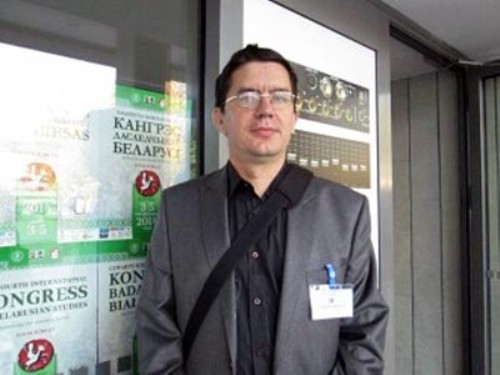Poland and Germany were both initiators and drivers of a New Eastern policy linked to the Eastern neighborhood and Russia/Soviet Union.
Aliaksei Lastouski: Ukraine serves as a background to all our reports, thoughts, and opinions

Why did scientists fly to the Congress in Kaunas so willingly even from the US? Of what its organizers can be proud, and which strivings went to wrack and ruin?
We continue talking with the Belarusan scientists who took part in the 4th International Congress of Belarusan Studies on October 3-5 in Kaunas (Lithuania) and drawing results of this significant for the academic community event.
This time a correspondent of EuroBelarus Information Service talked with Aliaksei Lastouski, sociologist, researcher of historical memory and national identity, an expert of the Institute for Political Sphere Institute of Political Studies.
— It is not for the first time that you are preparing the panel related to the history of the XX cent. However, in your opinion, what sections came to be the most interesting?
— If we talk about sections and panels, the problematics were regular and traditional for us: political, economic, and international relations. The section dedicated to the history of the Grand Duchy of Lithuania, and it seems to me that this year its level was the strongest.
It is interesting that some new problematics added this year. First of all, it is philology, which earlier wasn’t present at the Congress at all. We also got one more section related to the preservation of heritage and museology. We are happy to see that these topics, which are the subject of work of many researchers in Belarus, were properly covered at the Congress.
— Each year more and more researchers come to the Congress, this year there were about 450 scientists. In your opinion, what is this interest accounted for?
— Actually, last year when we were holding the Congress and evaluating the scale of the event, we decided that we should be ready for 350 people. And put a lot of effort to fit in this number of participants.
But all our strivings went to wrack and ruin, as we still got ` vast number of reporters who were persistent in their desire to participate. Even when we tried somehow restricting the number of participants, scientists still came at their own expense.
We immediately see that the event gained symbolic importance; it is really a huge intellectual forum. And for now we can’t do anything with the amount of participants, as each time more and more researchers of Belarus come. And we still don’t know what to do with that...
— What countries did participants of the forum come from this time?
— The geography is quite traditional. But, naturally, Belarus’ neighboring countries — Poland, Lithuania, Ukraine — are more interested in the Congress. Each year we are trying to include more Lithuanians, and this year we succeeded.
This year we had quite a delegation from the US who put their own money so that to be able to come to Kaunas, and it is very honorable for us.
We had a presenter from Australia for the first time this year. And of course, most European countries took part this year. Hopefully, in future we will have participants from all over the world.
— What famous Belarusans have visited the Congress? I know that the philosopher and literary man Valiantsin Akudovich finally came to the event, and, besides, Maksim Zhbankou, and Ihar Babkou were together with him in the train.
— Indeed, this year all our “intellectuals” and famous Belarusans came to the Congress — Valiantsin Akudovich, Maksim Zhbankou, and Michal Aniempadystau... These people didn’t manage to visit the Congress before.
It seems to me that this demonstrates the higher status of the event. And if you are an intellectual, a personality in Belarus, you just can’t miss the Congress.
It is interesting that people of different political views come to the Congress.
We are very proud of having famous and well-known intellectual Mykola Riabchuk at the Congress.
— What affect did the Ukrainian events have on the choice of topics for the scientific panels? Did the current Congress have Ukrainian emphasis?
— It turns out that if war happens close to your home it draws attention, it is impossible to omit or conceal. Of course, it is clear that first of all this problematics was actualized in the section on international relations. And a panel related to Ukraine was specifically organized.
It seems to me that all our reports, thoughts, and opinions have Ukraine problematics as background, it being really painful and important.
Others
-
Uladzimir Matskevich: The sooner the "Union State" is denounced, the better for Belarus
Not only does the “Union State” undermine the establishment of civilized relations with Europe, but it hinders the possibility of normal relations between Belarus and Russia.
-
Uladzimir Matskevich: The regime can no longer control the situation in the country
The authorities are unable to prolong the social contract with the people: there is no way out of the social crisis.
-
Press release of the BNP in connection with the next round of the dialogue in the format of the EU-Belarus Coordination Group
Belarusan National Platform of the Eastern Partnership Civil Society Forum welcomes the dialogue process in the format of the EU-Belarus Coordination Group, the third round of which was held in Minsk on 3-4 April 2017.
-
Hennadiy Maksak: Europe must react adequately to the events in Minsk
A new wave of political repressions should make the EU return to tougher policy towards the Belarusan regime.








Comments
From farewell to a new Eastern policy and towards a new development
Poland and Germany were both initiators and drivers of a New Eastern policy linked to the Eastern neighborhood and Russia/Soviet Union.